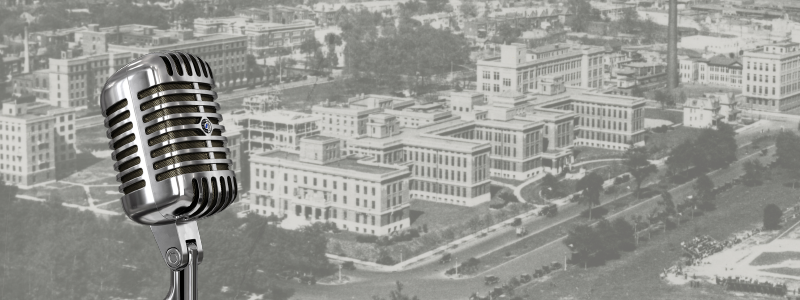
Washington University School of Medicine Oral Histories

Richard Hain Oral History
Interviewer
Bryan Sisk MD, MSCI
Files
Download Interview Transcript [PDF] (215 KB)
Summary
Richard Hain was interviewed by Brian Sisk on July 8, 2019 for approximately one hour and 17 minutes for the Pediatric Palliative Care Oral History Project.
Scope and Content
Dr. Richard Hain begins his interview by describing how his lifelong intentions of practicing in pediatrics developed into an intersecting interest in palliative medicine after hearing a lecture given by St. Christopher’s hospice. Dr. Hain then describes how he designed his medical school path to intersect at the disciplines of pediatric oncology, complex needs, pharmacology, and adult palliative medicine so that he would have the proper certifications to allow him the freedom to develop pediatric palliative to his vision: a multidisciplinary streamlined service with no barriers to access for those that needed the service. He says that while going through all that training would be “overkill now . . . it was well worth doing.”
Dr. Hain then describes how he began to form a community of like-minded healthcare providers in Wales that were able to develop and publish evidence of best practices for chronically ill and underserved children. This work eventually supported the discipline of pediatric palliative care becoming recognized as a subspecialty by the Royal College of Paediatrics and Child Health.
Early in his career, Dr. Hain was met with several resistant ideologies such as general disgust at the thought of administering children’s comfort care instead of solely cure-oriented care. Dr. Hain also described some discourse between clinicians that did not subscribe to recognizing pediatric palliative care “as a subspecialty within pediatrics and not a subspecialty within adult palliative care,” and some feelings from clinicians that pediatric palliative would take away from their practice rather than add another tool to health care. Dr. Hain also reflects on the role of opioids in palliative care, access and barriers to receiving pediatric palliative care, adult hospice and adult palliative care, the challenges the discipline has to overcome and the successes of in pediatric palliative.
Dr. Hain then explains his future vision for pediatric palliative care; streamlined access to care where the clinicians fulfill a healthcare companion role rather than a sterile clinical relationship while also maintaining that the clinicians are the professionals with a knowledge base that continues to evolve with the discipline. Dr. Hain would also like there to be a larger community nursing infrastructure as well as simplified treatment methods of providing complex care at-home.
Biographical Information: Interviewee
Richard Hain, MBBS, MD, FRCP (Edin), FRCP, FRCPCH, is a Consultant and all-Wales Clinical Lead of the tertiary Palliative Medicine services for the Children’s Hospital in Cardiff, United Kingdom. Dr. Hain has cultivated a multidisciplinary academic background in medicine, pharmacology, education, ethics, and theology. As a trainee clinician, Hain integrated his long-time passion for pediatric medicine with his interest in closing the service gap for under-served children with life-limiting and complex illnesses to ultimately develop a multidimensional palliative practice model. Dr. Hain trained in and continues to develop his interests through research in end-of-life ethics, epidemiology, service development in pediatric palliative care, opioid pharmacology, pain and therapeutic symptom control, pediatric oncology, and pediatric hematology. He has co-authored over 50 research articles, several books, and many book chapters.
Biographical Information: Interviewer
Bryan Sisk, MD, MSCI is an Assistant Professor in Pediatric Hematology and Oncology and an Assistant Professor in General Medical Sciences as a member of the Bioethics Research Center at Washington University in St. Louis. He completed medical school at the Cleveland Clinic Lerner College of Medicine at Case Western Reserve University. He completed his clinical training at St. Louis Children’s Hospital and Washington University School of Medicine.
Dr. Sisk was a clinical fellow in pediatric hematology and oncology when he initiated this Pediatric Palliative Care Oral History Project. As a trainee, Dr. Sisk had a strong interest in palliative care, the approach to the suffering of children, and the history of medicine. Prior to initiating this project, Dr. Sisk performed an in-depth review of the development of pediatric palliative care as a discipline and philosophy. This research culminated in a publication entitled, “Response to Suffering of the Seriously Ill Child: A History of Palliative Care for Children” in the journal Pediatrics. However, this historical review was limited to textbooks and publications. It lacked the personal experience of caring for these children and inspiring the development of a new clinical discipline. Inspired by David Clark’s oral history of the adult hospice movement, Dr. Sisk began to plan this pediatric oral history project.
Of note, this collection of oral histories is incomplete, and many important figures have not (yet) been interviewed. Dr. Sisk’s goal is to continue adding to this collection create a rich repository of personal insights and wisdom from leaders who changed the field of pediatrics.
Interview Date
2019-07-08
Collection Identifier
OH154-S16
Length
Approximately one hour and 17 minutes.
Restrictions
Users wishing to publish (in whole, or in part) content taken from the audio or transcript of this oral history interview must request, sign, and return a Statement of Use form to the Becker Archives. For detailed information regarding publication and use of this oral history, contact the Becker Archives (arb@wusm.wustl.edu).
Recommended Citation
Richard Hain Oral History, OH154-S16, Bernard Becker Medical Library Archives, Washington University in St. Louis.
Disclaimer
The Becker Archives provides access to this oral history interview as a record of the past. This interview reflects the attitudes, perspectives, and beliefs of the interview participants, which may reflect outdated, biased, and offensive views and opinions. The Becker Archives does not endorse the views expressed in this interview, which may contain materials offensive to some users.




Notes
Access to the audio recording for this oral history may be obtained via approval of the archivists at Becker Library. Contact the archives for more information (arb@wusm.wustl.edu).